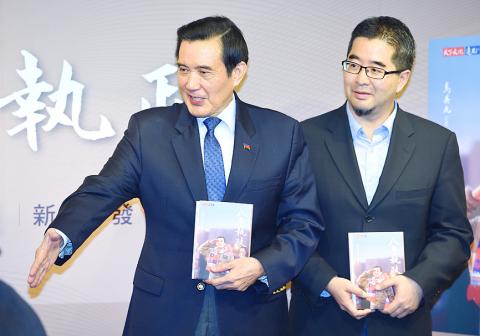Former president Ma Ying-jeou (馬英九) yesterday defended the Cross-Strait Service Trade Agreement with China that sparked the Sunflower movement and his “new three noes” policy at the launch of a book recounting his eight years in office.
The Sunflower movement protesters had called for an act to supervise cross-strait agreements, but nothing was done after President Tsai Ing wen’s (蔡英文) administration took office, Ma said, adding that the cross-strait service trade agreement was also left untouched.
At the time, the service sector was a major focus of the Chinese Communist Party’s 12th five-year plan and Taiwan’s service sector was superior to China’s, he said.

Photo: Liao Chen-huei, Taipei Times
If Taiwan had seized the opportunity and signed the pact, its service sector would have greatly benefited, he said, adding that this opportunity is gone forever.
At the question-and-answer session, Ma said that the “three noes” policy — no unification, no independence and no use of force — that he proposed during his time in office has since been adjusted to a “new three noes” policy — no exclusion of the possibility of unification, no independence and no use of force.
Unification is a goal set out in the Constitution, but the Constitution does not set a time frame or outline the conditions under which unification would occur, he said.
While he does not rule out unification, it can only be carried out under appropriate conditions and at an appropriate time, he said.
Unification needs to be carried out peacefully, the process must be democratic and it must occur at a time that Taiwanese can accept, he said.
Taiwan is maintaining the “status quo,” but if the conditions are good, discussion of unification is not impossible, he said, adding that this stance gives Taiwan more flexibility.
Ma said he hopes that this adjustment will enable Taiwan to respond to recent changes in cross-strait relations.
The memoir is written by former Presidential Office deputy secretary-general Hsiao Hsu-tsen (蕭旭岑) and based on Ma’s oral accounts.
Responding to Ma’s comments about not ruling out unification, Presidential Office spokesman Alex Huang (黃重諺) said that Ma sends a wrong message to the world at a time when the international community and Taiwan are looking for various ways to respond to Chinese suppression and interference in domestic affairs.
Ma’s statement makes it look as if Taiwan does not mind — and even approves of — Chinese suppression, he said.
The right of Taiwanese to decide their future should not be used as a bargaining chip for goodwill from China, he added.
This story has been corrected since it was first published to show that the Cross-Strait Service Trade Agreement was not a proposal, but a signed treaty, although it was not ratified by the Legislative Yuan.

US President Donald Trump said "it’s up to" Chinese President Xi Jinping (習近平) what China does on Taiwan, but that he would be "very unhappy" with a change in the "status quo," the New York Times said in an interview published yesterday. Xi "considers it to be a part of China, and that’s up to him what he’s going to be doing," Trump told the newspaper on Wednesday. "But I’ve expressed to him that I would be very unhappy if he did that, and I don’t think he’ll do that," he added. "I hope he doesn’t do that." Trump made the comments in

NOT AN OPENING: Trump’s violation of international law does not affect China’s consideration in attacking Taiwan; Beijing lacks capability, not precedent, an official said Taiwanese officials see the US’ capture of the president of Venezuela as a powerful deterrent to Beijing’s aggression and a timely reminder of the US’ ability to defeat militaries equipped with Chinese-made weapons. The strikes that toppled Venezuelan President Nicolas Maduro signaled to authoritarian leaders, including Chinese President Xi Jinping (習近平), US President Donald Trump’s willingness to use military might for international affairs core to US interests, one senior official in Taipei’s security circle said. That reassured Taiwan, the person said. Taipei has also dismissed the idea that Trump’s apparent violation of international law could embolden Beijing, said the official, who was not

A cold surge advisory was today issued for 18 cities and counties across Taiwan, with temperatures of below 10°C forecast during the day and into tonight, the Central Weather Administration (CWA) said. New Taipei City, Taipei, Taoyuan and Hsinchu, Miaoli and Yilan counties are expected to experience sustained temperatures of 10°C or lower, the CWA said. Temperatures are likely to temporarily drop below 10°C in most other areas, except Taitung, Pingtung, Penghu and Lienchiang (Matsu) counties, CWA data showed. The cold weather is being caused by a strong continental cold air mass, combined with radiative cooling, a process in which heat escapes from

Snow this morning fell on Alishan for the first time in seven years, as a strong continental cold air mass sent temperatures plunging across Taiwan, the Central Weather Administration (CWA) said. The Alishan weather station, located at an elevation of about 2,200m in central Taiwan, recorded snowfall from 8:55am to 9:15am, when the temperature dropped to about 1°C, the CWA said. With increased moisture and low temperatures in the high-altitude Alishan area, the conditions were favorable for snow, CWA forecaster Tsai Yi-chi (蔡伊其) said. The last time snow fell at the Alishan weather station was on Jan. 10, 2018, while graupel fell there